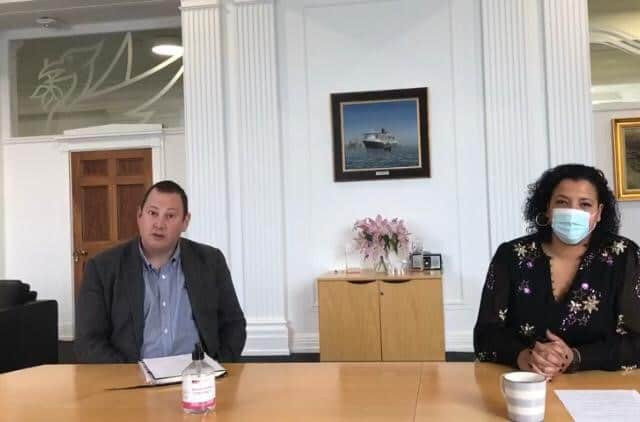Omicron COVID-19 variant: mutated virus accounts for 10% of cases in Liverpool
and live on Freeview channel 276
Liverpool is set to see a “sharp spike” in coronavirus cases in January, putting the NHS under a lot of pressure according to the city’s public health director.
Professor Matt Ashton also gave a strong warning about the threat the Omicron variant represents to the medical services in the city.
Advertisement
Hide AdAdvertisement
Hide AdLiverpool’s public health boss said that although Omicron only accounted for 9-10% of COVID-19 cases in the city, a much lower rate than in London and the South East, this rate will go up.
He added: “The reality is, we are going to see a sharp spike in COVID cases [which is likely to be] at the start of January, which will put a lot of pressure on the whole [healthcare] system.”
But Mr Ashton said the difference between this year and last winter is the vaccine, adding that the booster jab is estimated to provide 71-75% protection against symptomatic infection.
COVID-19 figures in Liverpool
Coronavirus cases in Liverpool are rising. In the seven days up to 11 December, Liverpool recorded 2,361 infections at a rate of 472 per 100,000.
Advertisement
Hide AdAdvertisement
Hide AdThat is a rise of 13% on the 2,067 cases seen in the previous week at the rate of 413 per 100,000.
With regards to the national picture, it was announced on Wednesday that the UK recorded 78,610 daily coronavirus cases - the highest since the beginning of the pandemic.
The news of the peak daily COVID-19 rate in the UK comes as Mayor of Liverpool Joanne Anderson and Professor Ashton urged people in the region to get vaccinated ahead of an expected wave of coronavirus cases.
Liverpool council said virus numbers are already on the rise and that Omicron cases are doubling every two to three days in the North West.
Advertisement
Hide AdAdvertisement
Hide AdThe latest regional level data released on Thursday, 16 December, shows 411 confirmed Omicron cases in the North West, up by 46 from the day before, with a further 4,673 suspected cases.
Suspected cases relate to PCR test samples that reveal a missing S-gene, which is not present in variants such as Omicron but present in Delta cases, and are yet to be confirmed through further definitive testing.
What’s been said
Leaders across the Liverpool City Region and the North West have urged the public to get booster jabs and vaccinations ahead of the expected surge in cases.


Mayor of Liverpool Joanne Anderson said: “I’ve had both my jabs as well a my booster jab, and I’ve done this not just to protect myself, but to protect everyone around me.
Advertisement
Hide AdAdvertisement
Hide Ad“It’s really important and such a small thing to do to make sure you are up to date with your jabs in order to prevent us not being able to see family and friends.
“I would urge anyone to book themselves in for an appointment.”
Liverpool’s Director of Public Health, Matt Ashton, said: “Demand for vaccination is very high at the moment so please be patient, but do book an appointment on the national booking system for your vaccine or your booster.
“In addition, carry on testing at least twice a week or in advance of going to any big events or social gathering, and if you’re a close contact of a positive case then please do daily testing to make sure you haven’t got COVID-19.”
Advertisement
Hide AdAdvertisement
Hide AdClare Morgan, Director of Strategy at Liverpool University Hospitals NHS Trust, said COVID-19 hospital admissions in Liverpool are “quite static” at the moment, but we will see what happens over the coming weeks.
This is an important point given that the spike in cases we are seeing nationally may take a few weeks to translate into more hospitalisations.
Despite the current numbers in hospital with COVID-19, Ms Morgan added that she is working with colleagues on a daily basis to assess the situation.